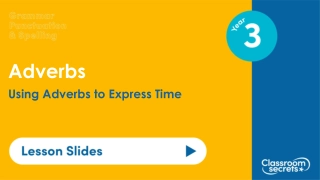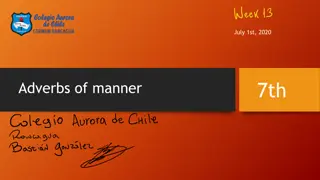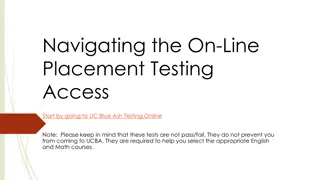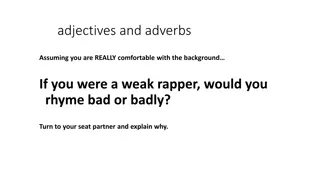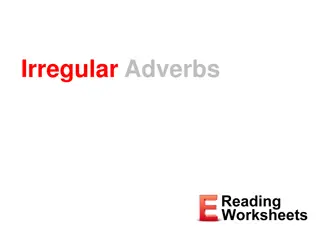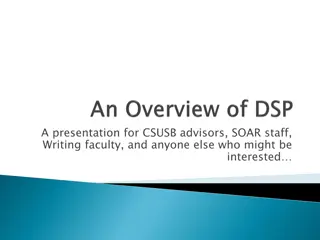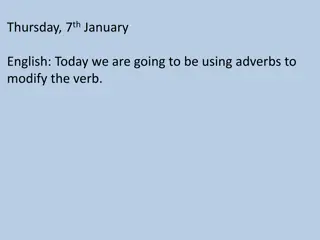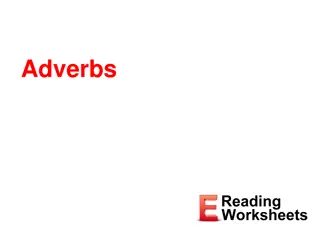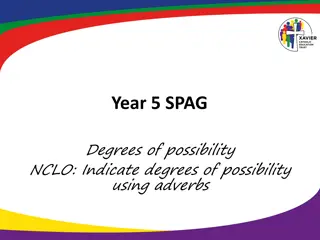Understanding Adverbs: Usage and Placement
Adverbs play a crucial role in enhancing the information provided by verbs, adjectives, and other adverbs in a sentence. They can indicate when, where, or how an action is performed, or express the quality or degree of an action. It is important to correctly place adverbs in a sentence to avoid changing the intended meaning. This article covers the definition of adverbs, their usage to modify verbs, adjectives, and adverbs, as well as tips for the proper placement of adverbs in sentences. An exercise is also provided to help identify adverbs in sample sentences.
Download Presentation

Please find below an Image/Link to download the presentation.
The content on the website is provided AS IS for your information and personal use only. It may not be sold, licensed, or shared on other websites without obtaining consent from the author. Download presentation by click this link. If you encounter any issues during the download, it is possible that the publisher has removed the file from their server.
E N D
Presentation Transcript
ADVERBS Adverbs are one of the four major word classes, along with nouns, verbs and adjectives. We use adverbs to add more information about a verb, an adjective, another adverb, a clause or a whole sentence and, less commonly, about a noun phrase.
ADVERBS An adverb is a word/a set of words that An adverb is a word/a set of words that modifies verbs, adjectives, and other adverbs. modifies verbs, adjectives, and other adverbs. It tells when, where, and how an action is It tells when, where, and how an action is performed or indicates the quality or degree of performed or indicates the quality or degree of the action. the action. Many adverbs end in Many adverbs end in - -ly ly but some words which end in end in - -ly ly (such as friendly) are not adverbs. (such as friendly) are not adverbs. Many words can be both adverbs and Many words can be both adverbs and adjectives according to their activity in the adjectives according to their activity in the sentence. sentence. but some words which
USE OF ADVERBS 1. to modify verbs The handball team played badly last Saturday. 2. to modify adjectives It was an extremely bad match. 3. to modify adverbs The handball team played extremely badly last Wednesday. 4. to modify quantities There are quite a lot of people here. 5. to modify sentences Unfortunately, the flight to Dallas had been cancelled.
PLACEMENT OF ADVERBS Place adverbs as close as possible to the words they are supposed to modify. Putting the adverb in the wrong spot can produce an awkward sentence at best and completely change the meaning at worst. Be especially careful about the word only, which is one of the most often misplaced modifiers. Consider the difference between these two sentences: Phillip only fed the cat. Phillip fed only the cat. The first sentence means that all Phillip did was feed the cat. He didn t pet the cat or pick it up or anything else. The second sentence means that Phillip fed the cat, but he didn t feed the dog, the bird, or anyone else who might have been around.
EXERCISE Identify the adverb in each of the following sentences. (i) They spoke loudly. (ii) I am highly impressed with her presentation. (iii) She looked quite nervous. (iv) Radha works diligently in order to get promoted. (v) Fox is often believed to be cunning animal. (vi) Barking dogs seldom bite. (vii) Earlier, they used to travel in their car. (viii) The birds were chirping merrily. (ix) I sometimes go for a walk in the park. (x) He never came to my place to visit me.
THANK YOU P CHRISTY NIRMALA AECS 2, KALPAKKAM






